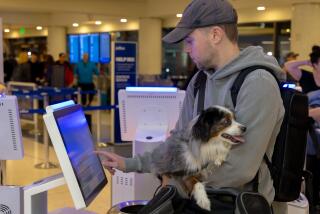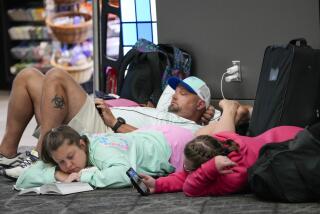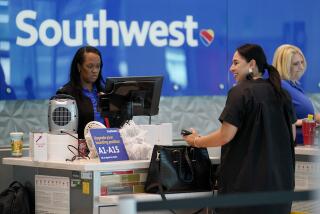Navigating Storms Over Summer Vacation Plans
To loosely paraphrase the leading tourist attraction in Stratford-on-Avon, England: Now is the spring of our discombobulation.
As we face these crucial weeks in the summer vacation decision-making season, prospective travelers have at least three reasons to hesitate:
* They may be worried about America’s economic downturn.
* They may be anxious about restricted access to rural areas in Britain because of measures imposed to halt the spread of foot-and-mouth disease.
* Or they may fear disruptive airline labor actions. In the past few weeks, some major U.S. carriers have been promoting merger plans while also struggling to make peace with their pilots, mechanics and flight attendants.
For consumers facing these uncertainties, it’s important to take extra care to avoid being blindsided.
When it comes to the tenuous U.S. economy, a fortuneteller is as good a bet as any to tell hesitant travelers what to do. But this is an excellent time to remind consumers of the dangers of using debt instead to pay for a vacation.
Richard Pittman, counseling director for the Consumer Credit Counseling Service of Los Angeles, notes that if you spend $2,000 on a trip and cover your spending with a credit card carrying 18% annual interest, then string out the payments at $50 a month, you’ll need 62 months to clear the debt, and the true cost of the trip, with interest, will be about $3,075.
The battle against foot-and-mouth disease in Britain and Ireland presents a different sort of challenge for travelers. Though the virus doesn’t affect humans, its risk to animal populations and agribusiness has prompted a barrage of emergency measures. If you’re planning to travel to the British Isles, check with sources at your destination (and your travel agent and your tour operator as well) to see whether your itinerary is affected. Instead of that daylong tramp along rural England’s Thames Path, you might lean toward a day of exploring the newly renovated and expanded British Museum in London.
Britain has established an Internet site, https://www.co-ordination.gov .uk, and a telephone number, 011-44-845-607-1071, to provide information on the disease and how it may affect travelers’ plans. Another helpful Web site, with links to the British, Irish and 28 other European government tourism offices, is https://www.visiteurope.com.
If you’re contemplating a broader itinerary change, for instance, one that means changing an airline ticket or canceling a prepaid hotel room, don’t assume that travel insurance will cover it.
At two of the largest U.S. travel insurance companies, CSA Travel Protection in San Diego and Travel Guard International in Stevens Point, Wis., claims agents said their cancellation/interruption policies don’t cover government decisions like those that have restricted travel in rural areas in Britain. (In most cases, tourism authorities say, roads remain open, and city life continues largely unchanged, but many walking paths, parks and farms are off-limits.)
On the question of labor actions, travel insurance protection also is iffy. CSA’s agent said the company’s policies exclude foreseeable events. And once a labor union has taken a strike authorization vote (as American’s flight attendants did in February, Delta’s pilots did in January and Northwest’s mechanics did in March), a strike is foreseeable, the agent said. (At United, flight attendants voted in late March to authorize “CHAOS” -- for “Creating Havoc Around Our System” -- strike tactics, although dates are still undisclosed.)
Of course, many or all of these possible perils may pass, and plenty of travelers are apparently expecting just that.
At Berkeley-based Backroads, a tour operator that specializes in biking and walking trips in North America and Europe, spokeswoman Julie Snyder reported that bookings to Britain and Ireland were running ahead of last year. (And last year was one of the best in the travel industry.)
At Seaside Travel, an agency in Long Beach, owner Ada Brown says her bookings also have been running ahead of last year-as much as 40% ahead-despite the widespread uncertainty.
Brown said she has taken a few questions on foot-and-mouth disease from Ireland-bound travelers, and she has been asked to handicap the odds of a strike at United. “But not one person has come in and said, ‘You know, the stock market is really falling, and I’m thinking about our trip this year.”’
Still, in many quarters, travelers and travel merchants are nervous. In fact, for counterweight to Brown’s report, listen to Susan Tanzman, owner of Martin’s Travel and Tours in West Los Angeles.
Tanzman reports that her leisure business is flat compared with last year, but she has noticed a trend in her conversations with customers.
“I honestly believe that the stock market is psychologically affecting everyone, except those people who are so rich that it doesn’t make a difference,” Tanzman said. “I don’t think I’ve had a client I’ve talked to in the last two weeks who hasn’t mentioned the stock market.”
Among the signs of uncertainty elsewhere:
* Worries over foot-and-mouth disease prompted Maupintour of Lawrence, Kan., to cancel May 12 and June 9 departures of its Cotswolds walking tours in England.
* At Cosmos & Globus tours based in Littleton, Colo., which sends about 40,000 Americans a year to Britain, vice president for marketing Scott Nisbet estimated that fewer than 5% of customers holding reservations have rescheduled or rerouted their bookings, with an even smaller percentage canceling. But Nisbet noted that since early March, the company has seen a “slower booking pace [among new customers], probably related to all three of these things’: the economy, restrictions in Britain and doubts about the airline labor situation.
From his office in Minneapolis, Terry Trippler, a 20-year travel agent affiliated with the Web site OneTravel.com and an expert on air fares, says his greatest worry isn’t recession or disease or even airline strikes, because he expects the Bush administration to block any formal strike action. But he does fear the mess that airline worker sickouts and work slowdowns could bring.
Trippler tells travelers that for the weeks to come, “you buy a ticket on American, Delta, Northwest or United at your own risk, understanding that there may be problems.”
It will pay to be vigilant. Most flight cancellations occur four days or less ahead of the departure date, sending ticket-holders into a scramble to rebook their travel. Those who act fastest are most likely to salvage their travel plans.
*
Christopher Reynolds welcomes comments, but he cannot respond individually to letters and telephone calls. Address your comments to Travel Insider, Los Angeles Times, 202 W. 1st St., Los Angeles, CA 90012, or send e-mail to chris.reynolds@latimes .com.
More to Read
Sign up for The Wild
We’ll help you find the best places to hike, bike and run, as well as the perfect silent spots for meditation and yoga.
You may occasionally receive promotional content from the Los Angeles Times.







